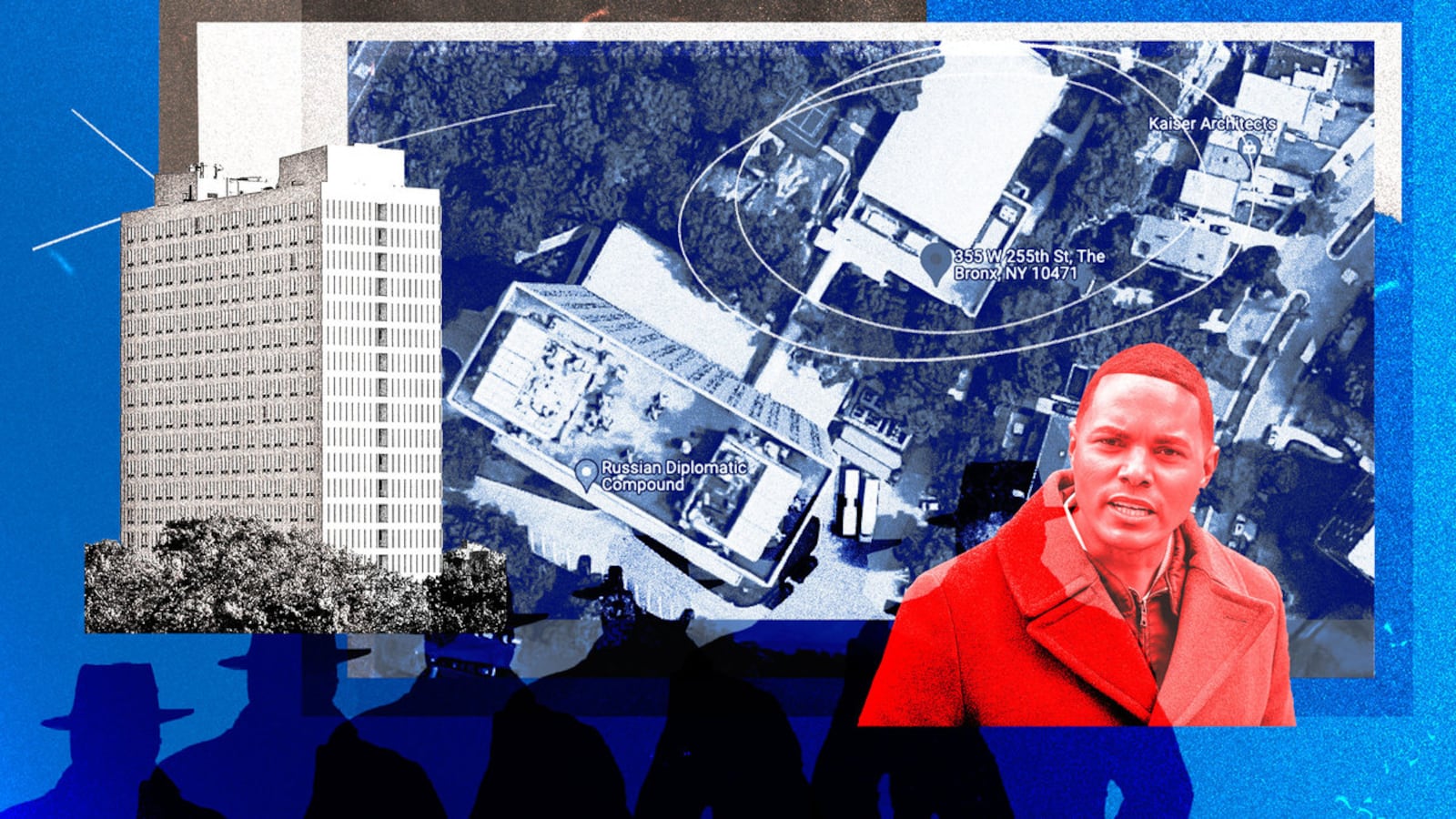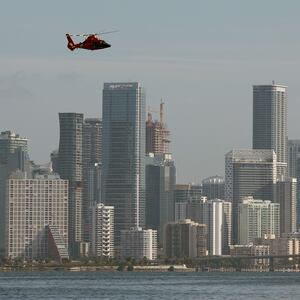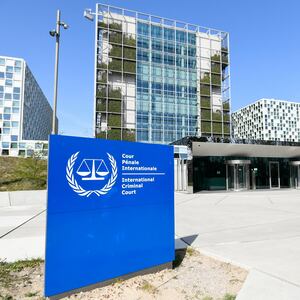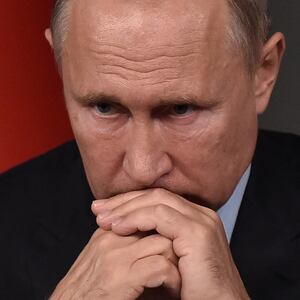The State Department is so worried that a Russian diplomatic compound in the Bronx is serving as a Russian spy hub that it held a classified briefing about the compound on Friday.
The previously unreported briefing touched on concerns about the compound and its potential ties to Russian espionage operations—concerns which Rep. Ritchie Torres (D-NY) raised in March of this year when he sent a letter to the Directors of the FBI, CIA, the Director of National Intelligence, and the Departments of Homeland Security and Justice.
Torres, a member of the House Homeland Security Committee, requested that the Biden Administration consider opening an investigation into the compound in order to protect the country against Russian espionage.
It’s not clear what the outcome of the meeting was. Torres declined to comment on what was discussed in the meeting, citing the classified nature of the gathering. Due to security reasons, the State Department also declined to share details about the meeting.
But the compound—located at 355 West 255th St. in Riverdale, NY—has long been suspected to serve not only as a residence for Russian diplomats, but also as an outpost for Russian intelligence agencies. Ever since the austere, 20-story white building in the complex was constructed in the 1970s to serve as an enclave for Russian diplomats working at the United Nations (UN), it’s been the focus of speculation that the Russians are using the building’s towering perch to conduct surveillance, evade U.S. intelligence operatives, and conduct other spy work.
Many Russian spies have been linked to the complex over the years. Earlier this year the United States expelled 12 Russian diplomats from Moscow’s UN mission for conducting intelligence operations against the United States. The Russian mission said at the time that most of its diplomats lived in the building.
In 2015, the FBI arrested Evgeniy Buryakov, a Russian man who eventually pleaded guilty to working for Russia’s Foreign Intelligence Service (SVR), and who lived nearby the compound. He worked under non-official cover and appeared to have a regular job as a banker in Manhattan, but really traded coded messages with Russian spies that went straight back to Moscow, according to the Department of Justice.
In a classic case of spy versus spy, U.S. intelligence operatives have been working to track the Russian agents there for years. Robin Dreeke, a former FBI Special Agent and Head of the Counterintelligence Behavioral Analysis Program, told The Daily Beast that he and fellow FBI agents tried to track and recruit Russian spies known to live at the compound.
“They are known intelligence officers that work at the United Nations,” Dreeke told The Daily Beast, adding that they communicated some of their information back to Moscow from the Riverdale complex itself. “Being a diplomat is their day job, but really probably 90 percent of their job is being an intelligence officer, collecting on information gaps on behalf of Russia. They live there, guaranteed.”
New York and the Riverdale complex are teeming with Russian intelligence operatives, said John Sipher, who previously worked for the CIA’s clandestine service and ran Russian operations at headquarters.
“Russians have always had a very, very robust intelligence collection there,” Sipher told The Daily Beast. “New York is one of the premier spy cities in the world. There’s probably more targets of interest to foreign intelligence officers in New York than almost anywhere else, except perhaps, Washington.”
Although the contents of the State Department’s classified briefing aren’t clear, the status of the compound still appears to hang in the balance. The kind of investigation Torres is asking about—one that touches on counterespionage—would typically fall to the FBI, which is the top agency in the United States for preventing, investigating, and exposing intelligence operations in the United States.
But the FBI is deferring to the State Department. The FBI has told Torres that the question of whether the Russian diplomatic compound in Riverdale poses a national security risk or threat is not the bureau’s jurisdiction, and that it is instead up to the State Department’s Office of Foreign Missions (OFM), Torres told The Daily Beast.
It’s a curious turn of events that leaves the compound in something of a no man’s land, as it would be best to assume there is some espionage activity tied to the compound, according to Larry Pfeiffer, a former chief of staff to the CIA Director and former senior director of the White House Situation Room.
“It would be normal for any U.S. counterintelligence organization to assume that any and every Russian facility is going to be a place where espionage is conducted,” Pfeiffer, a former NSA analyst, told The Daily Beast.
But the FBI’s decision to back off doesn’t add up given its keen interest in the compound, according to Sipher.
“That seems really odd to me. There’s a long history of the FBI in particular watching that compound up there for a variety of reasons,” Sipher told The Daily Beast. “The FBI has recruited a number of Russian spies who lived in the Riverdale complex over the years, and they know from their reporting that they use the place to try to hide from the FBI.”
The State Department’s OFM works to regulate the activities of foreign missions in the United States with an eye toward protecting U.S. national security. That includes protecting the United States from “abuses of privileges and immunities by members of the foreign missions.”
But the OFM hasn’t traditionally had resourcing or capabilities to handle an FBI-level counterintelligence investigation, according to Brett Bruen, a former U.S. diplomat and National Security Council official.
“OFM is a pretty small operation and any capacity that they would have to investigate would be fairly limited, certainly not to look into major intelligence issues of interest. That’s not their area. They would be responsible for abuses, parking passes, those kind of minor administrative matters,” Bruen said. “I just don’t envision any scenario in which they would be charged with looking into intelligence activities of another country or even a compound.”
A State Department spokesperson told The Daily Beast: “As a general matter we do not comment on correspondence with Congress, nor do we comment on intelligence matters. We can confirm that the Riverdale compound is the State Department’s jurisdiction.”
Whatever happened in the State Department meeting hasn’t lessened the spying concerns. As a followup to the meeting, Torres sent a letter to FBI Director Christopher Wray and Attorney General Merrick Garland on Tuesday evening, imploring the FBI to intervene.
“I write to express concerns I hear from my constituents about the operation at the Russian Diplomatic Compound,” Torres said in the letter, which his office shared with The Daily Beast. “Given the heightened risk of Russian retaliation against the United States for aiding the Ukrainian struggle for self-rule, the FBI should strongly consider assessing whether the presence of the Russian Diplomatic Compound in the Bronx threatens the national security interests of the United States.”
The FBI, for its part, needs to take accountability for the compound, Torres told The Daily Beast.
“The FBI is downplaying the crucial role that it can play in the ultimate closing of the compound. If the FBI were to assess the compound as a national security risk, the Office of Foreign Missions would be left with no choice but to take corrective action,” Torres told The Daily Beast. “When the FBI speaks, OFM listens. And yet the FBI has been silent when it comes to the national security risks of the Russian diplomatic compound in Riverdale.”
The FBI declined to comment on this story.
The news of the State Department’s attempt to address Torres’ concerns and his letter come as world leaders around the globe are trying to clamp down on Russian spying operations as Russia continues to wage war in Ukraine. The MI6 chief, Richard Moore, revealed last week at the Aspen security conference that approximately half of Russian spies operating as diplomats in Europe—400 of them—have been expelled from Europe since Russia invaded Ukraine.
The expulsions have likely hampered Russian intelligence-gathering in Europe on key topics, such as European sanctions plans and other efforts to counter Russia, which could inform the Kremlin’s war plans.
The CIA, FBI, and the Office of the Director of National Intelligence declined to share details on similar U.S. efforts.
But while Russia wages war in Ukraine, now is as good a time as ever to investigate the compound, Torres said.
“The notion of allowing Russian espionage to go unchecked at the diplomatic compound in Riverdale at a time when Russia has threatened cyber retaliation against the United States is profoundly reckless and dangerous,” Torres said.
The United States might be hesitant to go after the compound for other reasons, such as to avoid tit-for-tat responses. As dissent among Russians has surged during Russia’s war in Ukraine, the U.S. government has been stepping up efforts to recruit disaffected Russians to serve as assets for the U.S. intelligence community. The FBI has been targeting Russians in Washington, D.C. in recent weeks to try convincing potential assets to turn. Going after the compound might jeopardize this ongoing recruitment drive.
“Wouldn’t surprise me if there were FBI agents getting lunch more frequently at the diners around there,” Pfeiffer said.
Over the years, the U.S. government has taken various steps to oust Russian spies from the United States—and shutting down compounds isn’t an entirely outlandish idea. The Obama administration shuttered two Russian compounds in New York and Maryland in 2016 that U.S. intelligence officials said Moscow used for intelligence collection. The administration also expelled 35 Russian officials they said were working as Russian spies.
At the time, the United States said it was retaliating for Russia’s interference in the 2016 U.S. presidential elections.
But the U.S. government can shutter compounds without needing to justify it as a political move; The compounds and some of those expelled in 2016 were running a sweeping counterintelligence operation in the United States—they’d figured out ways to evade FBI surveillance, track down U.S. intelligence communications, and ultimately communicate with their assets, according to a Yahoo News report.
And at this point, a full accounting of what goes on at Riverdale—and how it benefits Russia’s espionage goals—still needs to be done, according to Torres.
“Why would Russia locate the compound at the highest point of elevation in the Bronx? There’s nothing accidental about the siting,” Torres told The Daily Beast. “It stands both literally and metaphorically as a structure of surveillance.”










